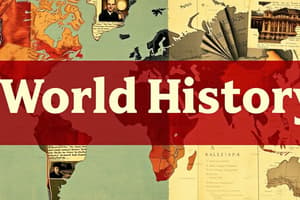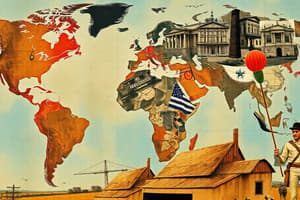Podcast
Questions and Answers
What period does the post classical period cover?
What period does the post classical period cover?
- 1200-1450 bc (correct)
- 1900-current
- 1750-1900
- 1450-1750
What is the time frame for the early modern period?
What is the time frame for the early modern period?
- 1900-current
- 1200-1450
- 1450-1750 (correct)
- 1750-1900
What is the time frame for the modern period?
What is the time frame for the modern period?
- 1200-1450
- 1900-current
- 1450-1750
- 1750-1900 (correct)
What does the contemporary period cover?
What does the contemporary period cover?
Which countries are included in East Asia during 1200-1450?
Which countries are included in East Asia during 1200-1450?
What does '1200-1450 China' refer to?
What does '1200-1450 China' refer to?
What is a major educational feature of Song China?
What is a major educational feature of Song China?
What is the 'mandate of heaven' in Chinese history?
What is the 'mandate of heaven' in Chinese history?
What does filial piety mean?
What does filial piety mean?
What was one effect of champa rice?
What was one effect of champa rice?
What is 'Dar al-Islam'?
What is 'Dar al-Islam'?
Who was Ibn Battuta?
Who was Ibn Battuta?
What were the roots of education in Dar al-Islam?
What were the roots of education in Dar al-Islam?
Which three major religions dominated Southeast Asia?
Which three major religions dominated Southeast Asia?
What was the Dehli Sultanate?
What was the Dehli Sultanate?
What does the term 'Bhakti Movement' refer to?
What does the term 'Bhakti Movement' refer to?
What is Sufism?
What is Sufism?
What were the Aztecs, Incans, and Cahokia doing from 1200-1450?
What were the Aztecs, Incans, and Cahokia doing from 1200-1450?
Why was Africa considered more important than Europe from 1200-1450?
Why was Africa considered more important than Europe from 1200-1450?
What was Mali known for?
What was Mali known for?
Why is Islam dominant in Africa?
Why is Islam dominant in Africa?
What was the significance of Ethiopia from 1200-1450?
What was the significance of Ethiopia from 1200-1450?
What are the notable features of Zimbabwe?
What are the notable features of Zimbabwe?
What is feudalism?
What is feudalism?
How did feudalism affect Europe?
How did feudalism affect Europe?
What does manorialism refer to?
What does manorialism refer to?
What is serfdom?
What is serfdom?
What effects did the Silk Road have?
What effects did the Silk Road have?
Name important trade cities associated with the Silk Road.
Name important trade cities associated with the Silk Road.
What new technologies emerged from the Silk Road?
What new technologies emerged from the Silk Road?
What empire did the Mongols create?
What empire did the Mongols create?
How were all khanates ruled?
How were all khanates ruled?
What are caliphates?
What are caliphates?
What are sultanates?
What are sultanates?
Shogunates are states controlled by individual ______ in Japan.
Shogunates are states controlled by individual ______ in Japan.
What happened to the Silk Road under Mongol rule?
What happened to the Silk Road under Mongol rule?
Where did the Mongols take over?
Where did the Mongols take over?
What was significant about Indian Ocean trade?
What was significant about Indian Ocean trade?
Flashcards are hidden until you start studying
Study Notes
Historical Periods
- Post Classical Period: Lasted from 1200 to 1450, characterized by extensive trade.
- Early Modern Period: Spanned 1450 to 1750, marked by conflicts between empires.
- Modern Period: From 1750 to 1900, defined by numerous revolutions.
- Contemporary Period: Encompasses 1900 to the current day, noted for high mortality rates.
East Asia (1200-1450)
- Major nations included Japan, Korea, and China.
- China was a melting pot of religions: Buddhism, Daoism, and Confucianism.
Key Concepts in Song China
- Civil Service Exam: A test for entry into the bureaucracy based on Confucian principles.
- Mandate of Heaven: Divine approval seen as the basis for royal legitimacy; disasters could signify loss of this mandate.
- Filial Piety: Confucian ideology emphasizing respect for elders.
- Champa Rice: Contributed to rapid population growth in China.
- Grand Canal: Vital for trade and transportation.
- Foot Binding: A cultural practice in Song China affecting women's social roles.
- Economic Innovations: Significant advancements in the economy during the Song dynasty.
Islamic and African Developments
- Dar al-Islam: Refers to "House of Islam," encompassing Islamic territories.
- Ibn Battuta: Renowned Arab traveler and scholar, known for documenting diverse cultures in Africa.
- Education in Dar al-Islam: Foundations laid in algebra, trigonometry, literature, and medicine.
- Southeast Asia's Major Religions: Hinduism, Buddhism, and Islam coexisted in the region.
- Delhi Sultanate: Established a centralized Muslim empire in India, influenced by invaders.
- Srivijaya: Controlled crucial trade routes between India and China.
Religious Movements
- Bhakti Movement: Popular Hindu devotional movement focused on individual deities.
- Sufism: Islamic mysticism akin to the Bhakti movement, emphasizing personal connection to God.
Pre-Columbian Cultures (1200-1450)
- Aztecs, Incans, and Cahokia thrived before European discovery, showcasing continuity, innovation, and diversity.
- Africa's Trade Significance: Emphasized its importance due to extensive trade networks.
- Mali Empire: Key trade city influencing Sub-Saharan commerce, controlled gold and salt trade under Mansa Musa.
Regional Dynamics
- Ethiopia: A Christian region connected to Indian Ocean trade networks.
- Great Zimbabwe: Known for its impressive pyramids and participation in the Indian Ocean trade.
European Feudal System
- Feudalism: A hierarchical system based on land ownership and tenant obligations, creating localized governance.
- Manorialism: Daily life centered around lords’ estates, with serfs laboring on the land.
Trade and Innovation
- Silk Road: Fostered trade cities and the spread of technology and religions.
- Key Silk Road Cities: Kashgar and Samarkand were prominent hubs.
- Innovations: Included the compass, paper money, maritime advancements, and the astrolabe.
Mongol Empire
- Mongols established the second largest empire in history, the largest land-based empire.
- Governance by Genghis Khan's descendants created several khanates.
- Caliphates and Sultanates: Islamic empires emerging post-Muhammad; ruled by sultans in some cases.
- Mongol Era Impact: Increased security along the Silk Roads, facilitating trade growth.
- Expansion: The Mongols nearly conquered all of Asia and parts of Eastern Europe.
Indian Ocean Trade
- The Indian Ocean trade network was the first of its kind, significantly impacting global trade dynamics.
Studying That Suits You
Use AI to generate personalized quizzes and flashcards to suit your learning preferences.



